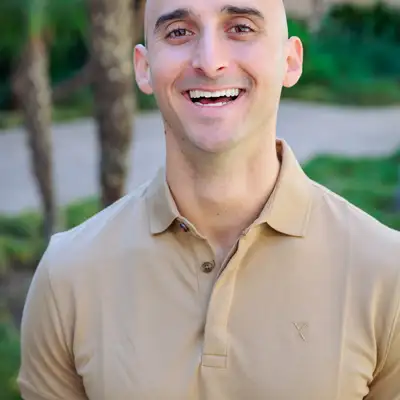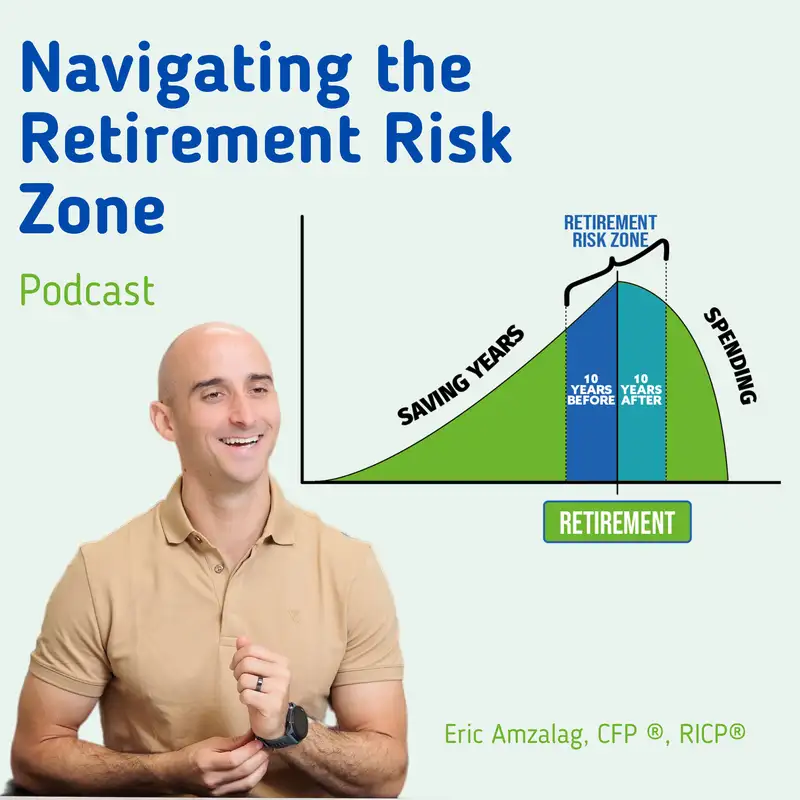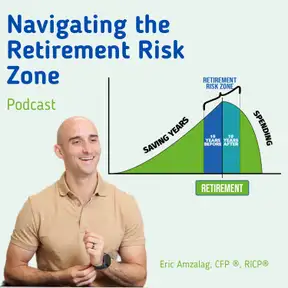4 Things The Most Successful Retirees Do...
Everyone gets anxiety about money. I've consulted 100 of pre retirees over the past couple years. And I've learned a few things. It doesn't matter how wealthy you are or how little money you have, you will have financial anxiety. If you're navigating the retirement risk zone, you're navigating uncharted brand new territory.
Eric Amzalag:And in navigating that brand new territory you need a new lens or a new framework through which to think about your financial well-being and your wealth. In this video we're gonna go through 4 key characteristics that can help you produce better retirement outcomes and reduce your anxiety around your retirement finances. The four key characteristics that I see across those that have the lowest anxiety about their retirement finances are certainty, reliability, predictability, and frequency. Now too often we think about just doing things, about taking action. We want to know if we should Roth convert money.
Eric Amzalag:We want to know if we have enough money at the time we're about to retire. We wanna know how much we should save. Where should we invest it? These are all good things. We need to think about actions.
Eric Amzalag:But what we really need is we need to understand what those actions are gonna produce so that we can reorganize the actions we want to take into the order of operations that produces the best impact and actually helps us manage our emotions. I've talked about this in other videos, but it's our emotions that cause the biggest retirement or financial problems. It's not our actions. Emotions lead to the actions that cause the problems. We'd be miss assessing the problem if we thought it was the actions when in fact it was the emotions.
Eric Amzalag:So let's go through these four characteristics one at a time and talk about what are the actions that lead to that characteristic that then produces the reduction in anxiety that you want to feel leading into your retirement. So the first was certainty. So certainty is arriving or having some way of identifying the amount of money you need in order to just make sure your basic needs are met in retirement. Now we need this certainty. The thing here to understand is getting certainty can come from knowing we have enough money to last us for the rest of our life so that we don't run out of money while alive.
Eric Amzalag:Right? That's the key retirement planning decision is do you have enough money before you retire so you don't make this catastrophic decision and retire and then end up 10 years down the line having run out of money? The problem to understand here is that the certainty that you have enough money does not do anything to tell you about the things you need to do in order to live the rest of your 30, 35, 40, however many years of life. Right? So it's just one block or part of this puzzle.
Eric Amzalag:Now I have other videos that you can watch that talk about what's called required portfolio income or RPI and how you can use that formula to create certainty, to back out how much you would need as a total pool of assets on the day you retire. So that you can retire comfortably and know you have enough money to last till end of life. Again, the problem here, and if we use an analogy, is to just remember that this is like having a destination plugged into Google Maps, but not having any of the driving directions that get you to the destination. The certainty retirement planners and the best people who have the lowest anxiety in retirement, they have curated what's called a reliability. Right?
Eric Amzalag:Reliability speaks to, in the same analogy, it would be the driving directions that get you from point a to your destination. So first, you have the certainty of knowing you have enough money to make it through end of life. Now you need reliability, which is sense of relief or understanding that tells you how you're gonna do all the turns and twists and driving directions to get you to the outcome. Again, you can use the required portfolio income formula to help you arrive at the final pool of assets you need on the day you retire. But now you need a set of decisions that tell you what to do as you retire.
Eric Amzalag:How are you gonna craft that income? What are the sources you'll take income from? What are the contingency plans if something happens and you need to change course of action? Right? You need that reliability.
Eric Amzalag:And really it starts by just identifying how you're going to craft your retirement income so that you know you have a reliable paycheck that comes to you each month in retirement. The third quality is predictability. So we've got certainty. We've got reliability. Now we need predictability.
Eric Amzalag:Predictability is the what if element. It's what if this happens. So I've got certainty and know how much money I need. I've got reliability. I know I'm gonna produce this paycheck.
Eric Amzalag:But what happens if things happen? What if I have a flood in my bathroom? What if I have a kid who needs financial support or a major medical emergency? What if the market completely has some kind of exogenous event and goes down the 2 goes down the tank? We need a a system of contingency plans in place that say, if all these things were to happen, I know how to course correct.
Eric Amzalag:And I've played out the model in my mind. I've spoken about it with my spouse or my financial planner or both. And now I know how to course correct if these things were to happen. That's what gives the sense of reliability. You know you can rely on your plan because you've thoroughly tested it when the worst outcomes were to happen.
Eric Amzalag:Right? It's not reliable till you do that testing. And this leads us to the 4th and final characteristic, which is frequency. So you've got certainty, you've got predictability, and you've got reliability. Now you have all these things in place.
Eric Amzalag:The problem is we desensitize to these things over time if they're not checked in with frequently enough. And so we need some kind of system that helps us touch base with our financial plans, our contingency plans, and our numbers frequently enough that we don't lose touch with these items. That we don't become so emotionally sensitive to them like we were before we did all this hard work. You don't wanna front load a lot of hard work at the beginning and then not maintain it. That would be like training for a marathon and then never running again after it.
Eric Amzalag:Marathon training would be about providing a higher level of fitness and a higher level of health. Don't just do it for the day of the marathon. Train for the rest of your life so you can be healthy and reduce the stress or the strain or the soreness you might feel if you stop working out and then start working out again. In the same manner with your retirement planning, you should have a regular frequency with which you check into your retirement plans, your contingency plans, and your numbers so you don't desensitize and can therefore live in retirement with lower levels of anxiety. I hope you found this information helpful.
Eric Amzalag:I think if you understand these four basic concepts, you can institute the behaviors in the right order to then live the same way as those that are most satisfied and happiest and least anxious in their retirement. If you have any comments or questions, please put them in the comment section below. We thank you so much for your time and attention. And if you have any interest and are not interested in doing your own retirement planning yourself, you can schedule a free consultation with our fee only fiduciary financial planning team using the form on our website. Thanks, and see you in the next video.
Creators and Guests


